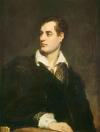The Devil return'd to hell by two,
And he stay'd at home till five;
When he dined on some homicides done in ragoût,
And a rebel or so in an Irish stew,
And sausages made of a self-slain Jew--
And bethought himself what next to do,
'And' quoth he, 'I'll take a drive.
I walk'd in the morning, I'll ride to-night;
In darkness my children take most delight,
And I'll see how my favourites thrive,
'And what shall I ride in?' quoth Lucifer then--
'If I follow'd my taste, indeed,
I should mount in a waggon of wounded men,
And smile to see them bleed.
But these will be furnish'd again and again,
And at present my purpose is speed;
To see my manor as much as I may,
And watch that no souls shall be poach'd away.
'I have a state-coach at Carlton House,
A chariot in Seymour Place;
But they're lent to two friends, who make me amends,
By driving my favourite pace:
And they handle their reins with such a grace,
I have something for both at the end of their race.
'So now for the earth to take my chance:'
Then up to the earth sprang he;
And making a jump from Moscow to France,
He stepp'd across the sea,
And rested his hoof on a turnpike road,
No very great way from a bishop's abode.
But first as he flew, I forgot to say
That he hover'd a moment upon his way,
To look upon Leipsic plain;
And so sweet to his eye was its sulphury glare,
And so soft to his ear was the cry of despair,
That he perch'd on a mountain of slain;
And he gazed with delight from its growing height,
Nor often on earth had he seen such a sight,
Nor his work done half as well:
For the field ran so red with the blood of the dead,
That it blush'd like the waves of hell!
Then loudly, and wildly, and long laugh'd he:
'Methinks they have here little need of me!'
But the softest note that soothed his ear
Was the sound of a widow sighing;
And the sweetest sight was the icy tear,
Which horror froze in the blue eye clear
Of a maid by her lover lying--
As round her fell her long fair hair
And she look'd to heaven with that frenzied air,
Which seem 'd to ask if a God were there!
And, stretch'd by the wall of a ruin'd hut,
With its hollow cheek, and eyes half shut,
A child of famine dying:
And the carnage begun, when resistance is done,
And the fall of the vainly flying!
But the Devil has reach'd our, cliffs so white,
And what did he there, I pray?
If his eyes were good, he but saw by night
What we see every day:
But he made a tour, and kept a journal
Of all the wondrous sights nocturnal,
And he sold it in shares to the Men of the Row,
Who bid pretty well--but they cheated him, though!
The Devil first saw, as he thought, the Mail,
Its coachman and his coat
So instead of a pistol he cock'd his tail,
And seized him by the throat:
'Aha!' quoth he, 'what have we here?
'Tis a new barouche, and an ancient peer!'
So he sat him on his box again,
And bade him have no fear,
But be true to his club, and stanch to his rein,
His brothel, and his beer;
'Next to seeing a lord at the council board,
I would rather see him here.'
The Devil gat next to Westminster,
And he turn'd to 'the room' of the Commons;
But he heard, as he purposed to enter in there,
That 'the Lords' had received a summons;
And he thought, as a ' quondam aristocrat,'
He might peep at the peers, though to hear them were flat;
And he walk'd up the house so like one of our own,
That they say that he stood pretty near the throne.
He saw the Lord Liverpool seemingly wise,
The Lord Westmoreland certainly silly,
And Johnny of Norfolk - a man of some size--
And Chatham, so like his friend Billy;
And he saw the tears in Lord Eldon's eyes,
Because the Catholics would not rise,
In spite of his prayers and his prophecies;
And he heard - which set Satan himself a staring--
A certain Chief Justice say something like swearing.
And the Devil was shock'd - and quoth he, 'I must go,
For I find we have much better manners below:
If thus he harangues when he passes my border,
I shall hint to friend Moloch to call him to order.'






